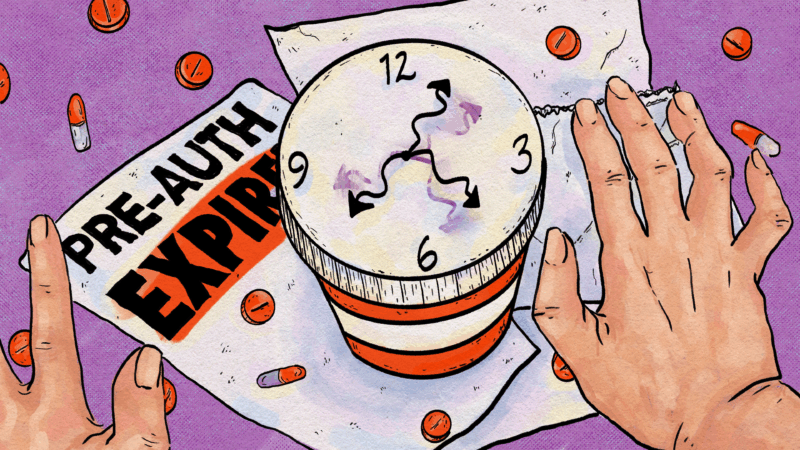The Learning Game
At Jefferson County’s Clay Elementary, it sure does sound like baseball, but these kids aren’t suited up — they’re geared up — to do math of all things.
And from the way she’s playing the educational computer program “Batter Up,” you’d think 4th grader Ashley Abrasley is destined for the Hall of Fame.
With her fingers planted on the right side of the keyboard — the ones with the numbers on it — Ashley waits for the pitch. Some division problems are hurled her way, plastered on the baseball that stops in full view: 10 divided by 5, 20 divided by 10; she zips through the inning like Babe Ruth.
“Well, I first started in second grade. (So you’ve been doing this for a while) Pretty much. (How do you think it’s helped you, I don’t know, do math better?) It just helps me go faster in it. Since it times you and everything. It helps me go faster and stuff.”
She doesn’t say much while she’s doing it; she can’t because she’s concentrating, but you can tell by her face — a look of combined excitement and nervousness — that she is really into this.
“Kids come to school early to play.”
Brenda Hancock is Ashley’s teacher.
“First of all, they want their batting average to go up. And in order for their batting average to go up, they have to practice speed and accuracy — are the two things — and they know that the faster they are and the more accurate they are, the better their batting average will be.”
Ashley’s batting well over 950.
Experts say it is because of her success that she’s likely to retain her math skills and build on them.
“Sports is a very important part of our culture. It gives us a sense of value and a sense of confidence in our ability to address difficult challenges and we usually celebrate when we’re successful at meeting those challenges.”
Dr. Mark Anshel is a professor of sport psychology at Middle Tennessee State University.
He says sports-themed educational programs work much like physical sports work for child athletes, by teaching the kids sportsmanship and teamwork.
There are several programs available to schools. One is “Batter Up,” which is quickly growing into a super-regional, if not national, online game that pits school against school and school system against others across the country. Kids compete for the highest batting average — i.e. math scores — and, this year for the first time, the finalists will square off in a few months here in Birmingham at McWane Center.
“You know, the competitiveness is something that motivates a very large percentage of kids of those ages. And to take the heat off, you put them in teams.”
David Vallincourt, the President of Virginia College online, created the game in the mid 1980s as a cardboard game – a “flash-card-meets-Louisville-Slugger” getup. Around the same time, he started developing software for it. It’s evolved into the version Ashley and her classmates use at Clay Elementary.
There aren’t a whole lot of studies that have been done about sports-themed educational programs and whether they increase learning capabilities. Vallincourt did his own research in 2004 for Nova Southeastern University and it shows test scores improved in all simple facets of math.
What is very telling is that a more detailed study by the Pew Internet and American Life Project shows 78 percent of kids 12-17 years old use the internet at school on a regular basis. And of all the kids who use the internet in general, a majority are online playing or reading about sports.
“What’s the one thing that they do every afternoon at recess? What’s the one thing they’re watching on TV like crazy? What’s the one thing that no matter where you are, they can do? And that’s kick a ball, throw a ball, play dodge ball, whatever it is.”
Former Auburn University football player Brian Shulman developed an educational program called Kid’s College through his company Learning through Sports. It not only focuses on math, but reading and Sportsmanship too. It not only uses baseball, but basketball, football and cheerleading.
“How can we take and channel what their love and interests, what they’re already interested in and channel it in the right areas? And that’s where I think that we’re — I don’t know where the train’s going, but it’s riding and it’s moving fast and we’re just along and we’re listening the best that we can to customers and teachers telling us where we need to go.”
So far, Shulman says — and with the help of partnerships such as the one they have with the Southeastern Conference and Mountain West — Kid’s College has been licensed to more than 21-hundred schools in 30 states.
Sports psychologist Dr. Mark Anshel says — just like in physical sports — there can be a downside to all this competition. He says that’s where all adults — parents and teachers — can learn some valuable lessons as well.
“…when they lose, we ignore, we berate them, we criticize them and, worst of all, we withdraw our love from them. And that’s what makes a very unhappy kid and very often leads to dropping out.”
Adults spend a whole lot of money watching sports; kids spend a whole lot of time. And just like marketers see dollar signs for both, educators see light bulbs — you know, the ones that go off when the brain is working. And light years of curriculum advancement.
For kids like 5th grader Jordan Millwood, it’s a matter of what keeps them interested and focused:
I remember just sitting down in the chair and just listening. Just pretty much writing stuff down and listening. (So you weren’t at all interested in what the teachers…) I hated school then. I mean, since 2nd grade, I’ve loved school since they put in sports.”
Now, she says, she’s aiming for the bleachers every time she walks into the classroom.
Feds announce $4.1 billion loan for electric power expansion in Alabama
Federal energy officials said the loan will save customers money as the companies undertake a huge expansion driven by demand from computer data centers.
Mortgage rates fall below 6% for the first time in years
The average home loan rate has dropped below 6% for the first time since 2022. Will that help thaw the frozen housing market?
Pentagon shifts toward maintaining ties to Scouting
Months after NPR reported on the Pentagon's efforts to sever ties with Scouting America, efforts to maintain the partnership have new momentum
Why farmers in California are backing a giant solar farm
Many farmers have had to fallow land as a state law comes into effect limiting their access to water. There's now a push to develop some of that land… into solar farms.
Every business wants your review. What’s with the feedback frenzy?
Customers want to read reviews and businesses need reviews to attract customers. But the constant demand for reviews could be creating a feedback backlash, experts say.
Can’t get a prescription renewed? Here’s how to cope with prior authorizations
These health care hurdles can stand in the way of getting treatment your doctor says you need. Here's what to know about how to deal with them.







